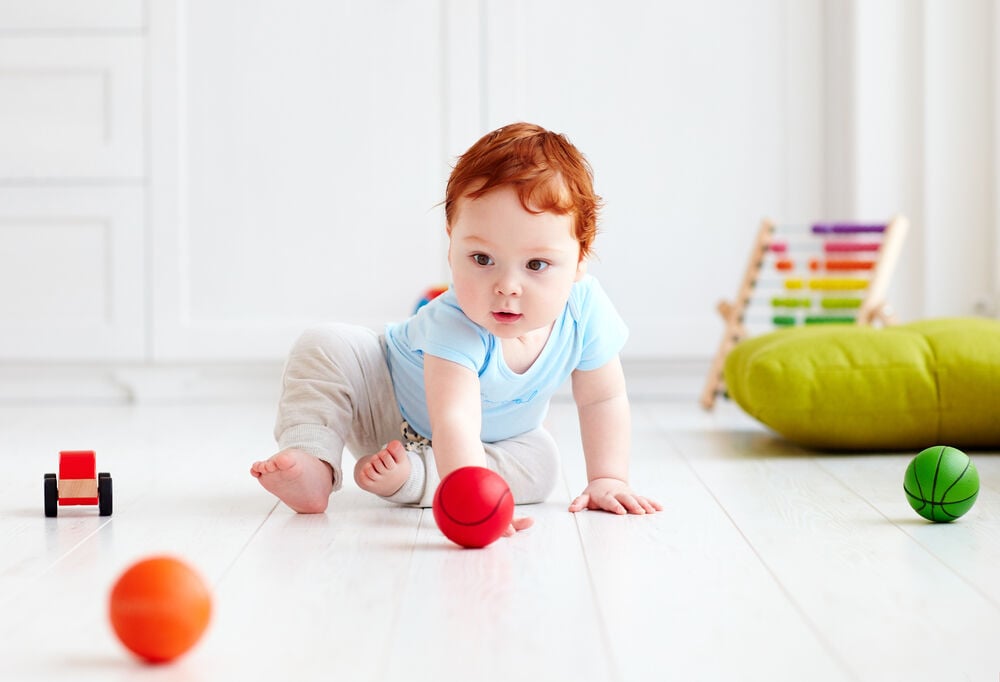At this age, your little one’s already more than halfway through their first year, which is a very exciting phase in their life and yours. Did you know, however, that playing certain games with them can not only encourage mother-baby bonding, but also aid early brain and motor skills development?
-
Tracking cycle
-
Getting pregnant
-
Pregnancy
-
Help Center
-
Flo for Partners
-
Anonymous Mode
-
Flo app reviews
-
Flo Premium New
-
Secret Chats New
-
Symptom Checker New
-
Your cycle
-
Health 360°
-
Getting pregnant
-
Pregnancy
-
Being a mom
-
LGBTQ+
-
Quizzes
-
Ovulation calculator
-
hCG calculator
-
Pregnancy test calculator
-
Menstrual cycle calculator
-
Period calculator
-
Implantation calculator
-
Pregnancy weeks to months calculator
-
Pregnancy due date calculator
-
IVF and FET due date calculator
-
Due date calculator by ultrasound
-
Medical Affairs
-
Science & Research
-
Pass It On Project New
-
Privacy Portal
-
Press Center
-
Flo Accuracy
-
Careers
-
Contact Us
The Best Games and Activities for Your 7-Month-Old Baby

Every piece of content at Flo Health adheres to the highest editorial standards for language, style, and medical accuracy. To learn what we do to deliver the best health and lifestyle insights to you, check out our content review principles.
How activities help your baby learn
Although your child is born with all the brain cells they’ll ever have, other areas of the brain continue to evolve throughout the toddler years. Approximately 1 million new neural connections, required for thought and movement, are created every single second. In fact, research shows that the human brain is 90 percent developed by the age of 5.
Soon, your baby will be crawling, walking, and even talking. During this crucial stage, you have countless opportunities to guide the learning process and help them flourish. There’s a wide variety of 7-month-old baby activities which are both positive and stimulating.
Flo is a fantastic app that keeps me on top of everything about my body. The period tracker is amazing.
7-month-old baby games list

Take a quiz
Find out what you can do with our Health Assistant
Watch your baby as they reach each milestone, and drive their learning by engaging as many senses as possible. New stimuli that they can hear, taste, touch, and smell foster the formation of neural connections for self-regulation, communication, motivation, and problem-solving. Experiment with the following techniques.
- Play with colors:
Between the ages of 5 and 7 months, experts believe that babies are developing the ability to see colors. Introduce an array of colors into your child’s surroundings. Consider using colored blocks, arranged in patterns or stacks, to enhance motor skills and coordination. Or, teach them how to paint with nontoxic food-based purees for more sensory-based stimulation.
- Listen to music and dance:
Of all the 7-month-old baby games you can try, this one’s guaranteed fun for the whole family. It’s also great for bonding and sharpening their cognitive abilities. Select a song that’s calm and soft, and keep the volume low. Show your child how to move their hands to the music. Then add in a few lyrics or sounds of your own to build listening skills and help create the neural pathways for processing speech.
- Blow bubbles:
Bubble-blowing is the perfect method for teaching your baby how to take advantage of their visual and tactile senses. Blow bubbles towards them so they can try to catch or pop them. Offer plenty of praise and words of encouragement along the way.
- Show them how to crawl:
Your child may already be rolling or scooting themselves from point A to point B, and soon, they’ll start crawling. Speed up the process by playing games like “follow the toy.” Bring a toy into their field of vision, then drag it away so that they’ll follow where it goes. Or, when your baby is an arm’s length away, ask them to come to you.
- Play with textures:
Incorporate toys of varying textures to activate their sense of touch. Look for stuffed animals or games composed of fabrics such as wool, silk, or corduroy. Limit how many you introduce at one time though, as you want to engage their senses without overwhelming them and causing them to lose interest.
- Make some noise:
For many 7-month-old baby games, noise should be an essential component. Think about turning cereal containers into rattles. Shake the object in front of your child, and allow them to identify the source of the noise. Once they’ve done so, hand it to them and let them shake it, too. You’ll engage their hearing and help them understand the relationship between cause and effect.
- Use bath toys:
Transform the bathtub into a fun learning environment with floating or inflatable toys which give your baby something to observe and touch. Ask them to reach out and grab the toys as they slowly float by. This promotes the development of tactile senses and demonstrates how water moves, as well as its effect on other objects.
- Mix up your approach:
In addition to the suggestions above, here’s a list of bonus games and activities for you and your child.
- The Toy Shadow Game: Turn on a flashlight and point it at the wall. Place a few toys between the flashlight and wall so they cast a shadow. Have your child reach for the toys and watch as the shadows change before their eyes. This activity hones their motor skills and cognitive abilities.
- Tummy Time: Lay your baby on their stomach and allow them to discover the toys nearby. It may even encourage crawling if an object happens to be just out of their reach. Consequently, your child will increase muscle strength, mobility, and much more.
- Rhyme Time Books: Read nursery rhymes and storybooks out loud to your baby to fine-tune their listening skills and boost auditory development.
- Hand Puppets: Use simple puppets to generate sounds and movements, and even funny voices, to capture your child’s attention. Allow them to reach out and touch the puppets. Your little one will benefit from this valuable sound-source interpretation exercise and be able to improve their hearing.
Tips and safety precautions
When participating in any 7-month-old baby games, your child’s comfort and safety are a top priority. You’ve likely done a great deal of research already, but just be sure to take the following steps.
- Ensure that any pointy corners or edges on nearby furniture are covered.
- Keep all low cupboards and doors baby-proofed and locked.
- Read toy labels and double-check that they’re age-appropriate for your child. Small objects and certain types of food present choking hazards. This includes popcorn, carrot sticks, nuts, hard candy, hot dogs, and grapes, as well as coins and batteries, etc.
- Do not give whole milk to your baby until they’re at least a year old. Also, never put them to bed with a bottle, as it can lead to dental caries, or cavities.
- Always remember to “just say no” to baby walkers, which are among the most dangerous pieces of equipment on the market today. Each year, roughly 9,000 children in the U.S. are injured while using baby walkers. They significantly increase the chances of your baby tumbling down a flight of stairs or gaining access to things that are normally out of their reach. This is why the American Academy of Pediatrics strongly urges parents not to use baby walkers.
To further ensure a safe and enjoyable experience for you and your baby, allow them to take some initiative with activities to stimulate learning. It’s also important to practice patience as they may need a little time to understand what you’re doing.
If your child seems agitated or tired, postpone the game and put them down for a nap instead. Try your best to stick to a schedule that adequately balances their playtime and downtime.
Lastly, involve friends and family members in 7-month-old baby activities. This will nurture your child’s interpersonal skills and encourage their socialization.


Hey, I'm Anique
I started using Flo app to track my period and ovulation because we wanted to have a baby.


The Flo app helped me learn about my body and spot ovulation signs during our conception journey.


I vividly
remember the day
that we switched
Flo into
Pregnancy Mode — it was
such a special
moment.
Real stories, real results
Learn how the Flo app became an amazing cheerleader for us on our conception journey.
References
https://www.mambaby.com/en-ca/you-and-your-baby/7-9-month/ https://www.parents.com/baby/development/growth/11-fun-activities-for-babies-6-to-12-months/ https://www.firstthingsfirst.org/early-childhood-matters/brain-development/ http://www.essentialbaby.com.au/baby/education-play/how-colour-can-affect-your-babys-development-20160725-gqdk1c https://www.momjunction.com/articles/learning-activities-for-your-7-month-old-baby_0077472/ https://www.sensorylifestyle.com/activities-0-24-months/top-10-sensory-activities-for-your-7-month-old/




